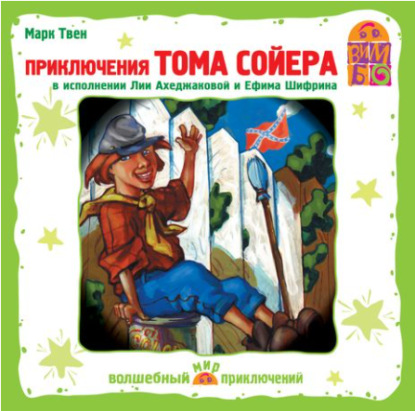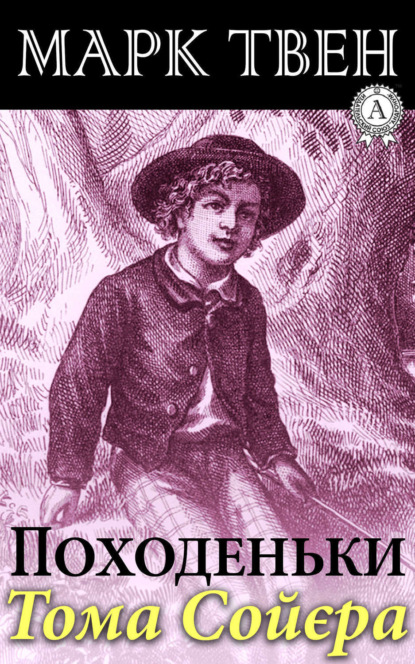
Полная версия:
Марк Твен Приключения Тома Сойера / The Adventures of Tom Sawyer
- + Увеличить шрифт
- - Уменьшить шрифт

Марк Твен / Mark Twain
Приключения Тома Сойера / The Adventures of Tom Sawyer
© Кутумина О. А., адаптация текста, словарь
© ООО «Издательство АСТ», 2019
Chapter I
“TOM!”
No answer.
“TOM!”
No answer.
“What’s happened with that boy, I wonder? You TOM!’
No answer.
Aunt Polly pulled her spectacles down and looked over them about the room; then she put them up and looked out under them. She even bent down, poked under the bed with the broom[1], and found nothing but the cat.
“Y-o-u-u TOM!”
There was a slight noise behind her and she turned just in time to seize a boy.
“There! What have you been doing in the pantry?”
“Nothing.”
“Nothing! Look at your hands. And look at your mouth. What IS it?”
“I don’t know, aunt.”
“Well, I know. It’s jam—that’s what it is. I’ve told you forty times not to touch it. Where’s my switch?”
“Wow! Look behind you, aunt!”
The old woman turned round, and the boy fled on the instant—he climbed up the high fence, and disappeared over it.
His aunt Polly stood surprised a moment, and then laughed.
“I can never learn anything! He’s played the same trick enough for me to remember it[2]! You can’t learn an old dog new tricks. I’m sure he won’t go to school this afternoon, and I’ll just have to make him work tomorrow, to punish him. It’s hard to make him work on Saturdays, when all the boys are having a holiday. But he hates work more than he hates anything else, so I’ve GOT to find some job for him.”
She was right. Tom didn’t go to school, and he had a very good time.
While Tom was eating his dinner later, and stealing sugar as opportunity offered, Aunt Polly asked him questions—for she wanted to catch him lying.
Said she:
“Tom, it was warm in school, wasn’t it?”
“Yes, mam.”
“Powerful warm, wasn’t it?”
“Yes, mam.”
“Didn’t you want to go in a-swimming, Tom?”
Tom searched Aunt Polly’s face, but it told him nothing. So he said:
“No, ma—well, not very much.”
The old lady reached out her hand and felt Tom’s shirt, and said:
“But you ain’t too warm now, though.”
Tom knew what was coming, now. So he said:
“Some of us pumped water on our heads—mine’s still damp. See?”
Aunt Polly got upset that she had overlooked that bit of circumstantial evidence. Then she had a new inspiration:
“Tom, you didn’t have to undo your shirt collar where I sewed it, to pump on your head, did you? Unbutton your jacket!”
Tom opened his jacket. His shirt collar was securely sewed.
“Bother! Well, I was sure you skipped school and went swimming. But I forgive ye, Tom. This time.”
But then Sid, Tom’s younger brother, said:
“You sewed his collar with white thread, but now it’s black.”
“Why, I did sew it with white! Tom!”
But Tom did not wait for the rest. As he went out at the door he said:
“Siddy, I’ll lick you for that[3].”
In a safe place Tom examined two large needles that he had stick into the lapels of his jacket. They both had thread attached to them—one needle had white thread and the other black. He said:
“She’d never noticed if it hadn’t been for Sid. Sometimes she sews it with white, and sometimes she sews it with black. I wish she picked one or the other—I can’t keep track of them!”
Tom was not the model boy of the village. But Sid was—and Tom hated him sometimes.
Within two minutes, or even less, he had forgotten all his troubles because he found a new interesting activity—whistling. He had learned to whistle a couple of days ago and now he decided to practise it.
The summer evenings were long so he had a lot of time ahead.
Then he saw a stranger boy a little larger than himself. Meeting a new-comer of any age of either sex was an important in the poor little village of St. Petersburg. This boy was well dressed—on a week-day. He even had shoes on—and it was only Friday. You could see that he was from the city. The more Tom stared at the stranger, the higher he turned up his nose and the shabbier his own outfit seemed to him. Neither of the boys spoke. If one moved, the other moved—but only to the side; so they were moving in a circle; keeping face to face and eye to eye[4] all the time. Finally Tom said:
“I can lick you!”
“I’d like to see you try it.”
“Well, I can do it.”
“No you can’t, either.”
“Yes I can.”
“No you can’t.”
“I can.”
“You can’t.”
“Can!”
“Can’t!”
An uncomfortable pause. Then Tom said:
“What’s your name?”
“‘Tisn’t any of your business, maybe.”
“Well I’ll make it my business.”
“Well why don’t you?”
“If you say much, I will.”
“Much—much—much. There now.”
“Oh, you think you’re mighty smart, don’t you? I could lick you with one hand tied behind me, if I wanted to.”
“Well why don’t you do it? You say you can do it.”
“Well I will, if you fool with me.”
“Oh yes—I’ve seen whole families in the same fix.”
“Smarty! You think you’re some, now, don’t you? Oh, what a hat!”
“You can lump that hat if you don’t like it. I dare you to knock it off—and anybody that’ll take a dare will suck eggs.”
“You’re a liar!”
“You’re another.”
“You’re a fighting liar.”
“Aw—take a walk!”
“Say—if you give me much more of your sass I’ll take and bounce a rock off’n your head.”
“Oh, of course you will.”
“Well I will.”
“Well why don’t you do it then? What do you keep saying you will for? Why don’t you do it? It’s because you’re afraid.”
“I ain’t afraid.”
“You are.”
“I ain’t.”
“You are.”
Another pause. Presently they were shoulder to shoulder. Tom said:
“Get away from here!”
“Go away yourself!”
“I won’t.”
“I won’t either.”
So they stood, glowering at each other with hate. But neither could get an advantage. Tom said:
“You’re a coward and a pup. I’ll tell my big brother on you, and he can beat you with his little finger, and I’ll make him do it, too.”
“What do I care for your big brother? I’ve got a brother that’s bigger than he is—and what’s more, he can throw him over that fence, too.”
–
“That’s a lie.”
“Your saying so don’t make it so.”
Tom drew a line in the dust with his foot and said:
“I dare you to step over that, and I’ll lick you till you can’t stand up.”
The new boy stepped over promptly, and said:
“Now you said you’d do it, now let’s see you do it.”
“Don’t you crowd me now; you better look out.”
“Well, you said you’d do it—why don’t you do it?”
“For two cents I will do it.”
The new boy took two broad coppers out of his pocket and held them out. Tom struck them to the ground. In an instant both boys were rolling and tumbling in the dirt, gripped together like cats; and for the space of a minute they tugged and tore at each other’s hair and clothes, punched and scratched each other’s nose, and covered themselves with dust and glory. Presently the confusion took form, and through the fog of battle Tom appeared, seated astride the new boy, and pounding him with his fists.
The boy only struggled to free himself. He was crying—mainly from rage.
At last the stranger got out a smothered “Enough!” and Tom let him go and said:
“Now that’ll learn you. Better look out who you’re fooling with next time.”
The new boy went off brushing the dust from his clothes, sobbing, and shouting what he would do to Tom the “next time he caught him out[5].’
When Tom’s turned to go, the new boy took a stone, threw it, hit him Tom between the shoulders and then ran away as fast as he could. Tom chased him home, and waited at the gate for some time, inviting the enemy to come outside. At last the enemy’s mother appeared, and called Tom a bad, evil child.
Tom got home rather late that night, and when he climbed in through the window, he was caught by his aunt immediately. When she saw the state of his clothes her resolution to turn his Saturday holiday into captivity at hard labor became set in stone.
Chapter II
Saturday morning came, and all the summer world was bright and fresh. There was a song in every heart and a smile on every face.
But Tom was not very happy when he appeared in the street with a bucket of whitewash and a brush with a long handle. When he looked at the fence, so long and high, he felt depressed. Sighing, he dipped his brush and passed it along the top plank; repeated the motion; did it again; compared the insignificant whitewashed streak with the enormous continent of unwhitewashed fence, and sat down in the shade, discouraged.
Then he saw Jim, a slave boy, who was running out of the gate with a bucket. Tom himself had always hated bringing water from the town pump. But it seemed better than whitewashing. Tom said:
“I say, Jim, I’ll bring the water if you whitewash a part of the fence.”
Jim shook his head and said:
“I can’t, master Tom. Your aunt said you had to do it all. She’ll be angry if she learns that I helped you.”
“Oh, never you mind what she said, Jim. That’s the way she always talks. Gimme the bucket—I will be gone only a minute. She won’t ever know.”
When the boys noticed Aunt Polly coming out of the house Jim ran away with his bucket and Tom got back to whitewashing[6]. But his energy did not last. He began to think of the fun he had planned for this day. He got out his wealth out of his pocket and examined it—bits of toys, marbles, and trash; enough to buy an exchange of work, maybe, but not enough to buy even half an hour of pure freedom.
At this dark and hopeless moment he found a way out.
He took up his brush and went to work. Ben Rogers—the very boy, of all boys, whose ridicule Tom had been dreading—was walking along the street eating an apple. From time to time he produced melodious sounds: ding-dong-dong, ding-dong-dong, for he was impersonating a steamboat[7]. As he came closer, he called:
“Tom!”
No answer. Tom was whitewashing the fence; he surveyed his last touch with the eye of an artist, then gave his brush another gentle sweep and surveyed the result, as before. Tom’s mouth watered for the apple, but he continued working. Ben said:
“Hello, old chap!”
Tom turned to Ben.
“Why, it’s you, Ben! I didn’t notice you.”
“I’m going swimming. Don’t you wish you could? But of course you’d rather work—wouldn’t you? Course you would!”
“What do you call work?”
“Why, isn’t THAT work?”
Tom continued his whitewashing, and answered carelessly:
“Well, maybe it is, and maybe it isn’t. All I know is it suits Tom Sawyer.”
“Don’t say you LIKE it. I won’t believe you!”
The brush continued to move.
“Like it? Well, does a boy get a chance to whitewash a fence every day?’
That put the thing in a new light. Ben stopped biting his apple. He was watching Tom’s every move and was getting more and more interested. At last he said:
“Tom, let ME whitewash a little.”
Tom considered it, and then said:
“If it was the back fence I wouldn’t mind and Aunt Polly wouldn’t. But it’s the front fence; it must be done very carefully. There isn’t one boy in a thousand, maybe two thousand, that can do it the way it should be done.”
“Oh, let me just try. Only just a little. I’ll give you the core of my apple[8].”
Tom considered it. He said:
“No—no—It wouldn’t do, Ben. You see, Aunt Polly’s awful particular about this fence—right here on the street, you know—but if it was the back fence I wouldn’t mind and _she_ wouldn’t. Yes, she’s awful particular about this fence; it’s got to be done very careful; I think there ain’t one boy in a thousand, maybe two thousand, that can do it the way it’s got to be done.”
“No—is that so? Oh come, now—lemme just try. Only just a little.”
“Ben, I’d like to, but Aunt Polly—well, Jim wanted to do it, but she wouldn’t let him; Sid wanted to do it, and she wouldn’t let Sid. If you do a bad job—”
“I’ll be just as careful. Now lemme try. Say—I’ll give you the core of my apple.”
“No, Ben, I’m afraid—”
“I’ll give you ALL of it!”
Tom gave the brush to Ben with reluctance in his face, but cheerfulness in his heart . And while the boy worked and sweated in the sun, the retired artist sat on a barrel in the shade close by, dangled his legs, ate his apple, and planned. By the time Ben got tired, Tom had traded the next chance to Billy Fisher for a kite; and when he finished, Johnny Miller bought in for a dead rat and a string to swing it with—and so on, and so on, hour after hour. By the afternoon, Tom had become a wealthy boy. Besides the before mentioned things, he had twelve marbles, a piece of blue bottle-glass to look through, a key that wouldn’t unlock anything, a tin soldier, a kitten with only one eye, the handle of a knife, and a lot of other valuable things.
He had had a nice, good, time, plenty of company—and the fence had three coats of whitewash on it[9].
Tom said to himself that it was not such a hollow world, after all. He had discovered a great law of human action, without knowing it—namely, that in order to make a man or a boy want something, it is only necessary to make it difficult to obtain.
Chapter III
Tom came to the living-room which was their bedroom, breakfast-room, dining-room, and library at the same time. Aunt Polly was sitting by an open window. She was sure that Tom had left long ago, and she was surprised at seeing him.
“May I go and play now, aunt?” he asked.
“What, already? How much have you done?”
“It’s all done, aunt.”
“Tom, don’t lie to me—I can’t bear it.”
“I ain’t, aunt; it is all done.”
Aunt Polly went out to see for herself. When she found the whole fence whitewashed thoroughly, her astonishment was almost unspeakable.
Конец ознакомительного фрагмента.
Текст предоставлен ООО «ЛитРес».
Прочитайте эту книгу целиком, купив полную легальную версию на ЛитРес.
Безопасно оплатить книгу можно банковской картой Visa, MasterCard, Maestro, со счета мобильного телефона, с платежного терминала, в салоне МТС или Связной, через PayPal, WebMoney, Яндекс.Деньги, QIWI Кошелек, бонусными картами или другим удобным Вам способом.
Примечания
1
poked under the bed with the broom – пошарила под кроватью щеткой
2
He’s played the same trick enough for me to remember it – он проделывал этот трюк со мной достаточно много раз, чтобы я могла его запомнить
3
I’ll lick you for that—теперь тебе мало не покажется
4
keeping face to face and eye to eye – держались лицом к лицу, глаза в глаза друг с другом
5
next time he caught him out– когда его в следующий раз поймает
6
got back to whitewashing – принялся красить
7
he was impersonating a steamboat – изображал пароход
8
core of an apple – сердцевина яблока
9
fence had three coats of whitewash on it – забор был покрашен в три слоя







